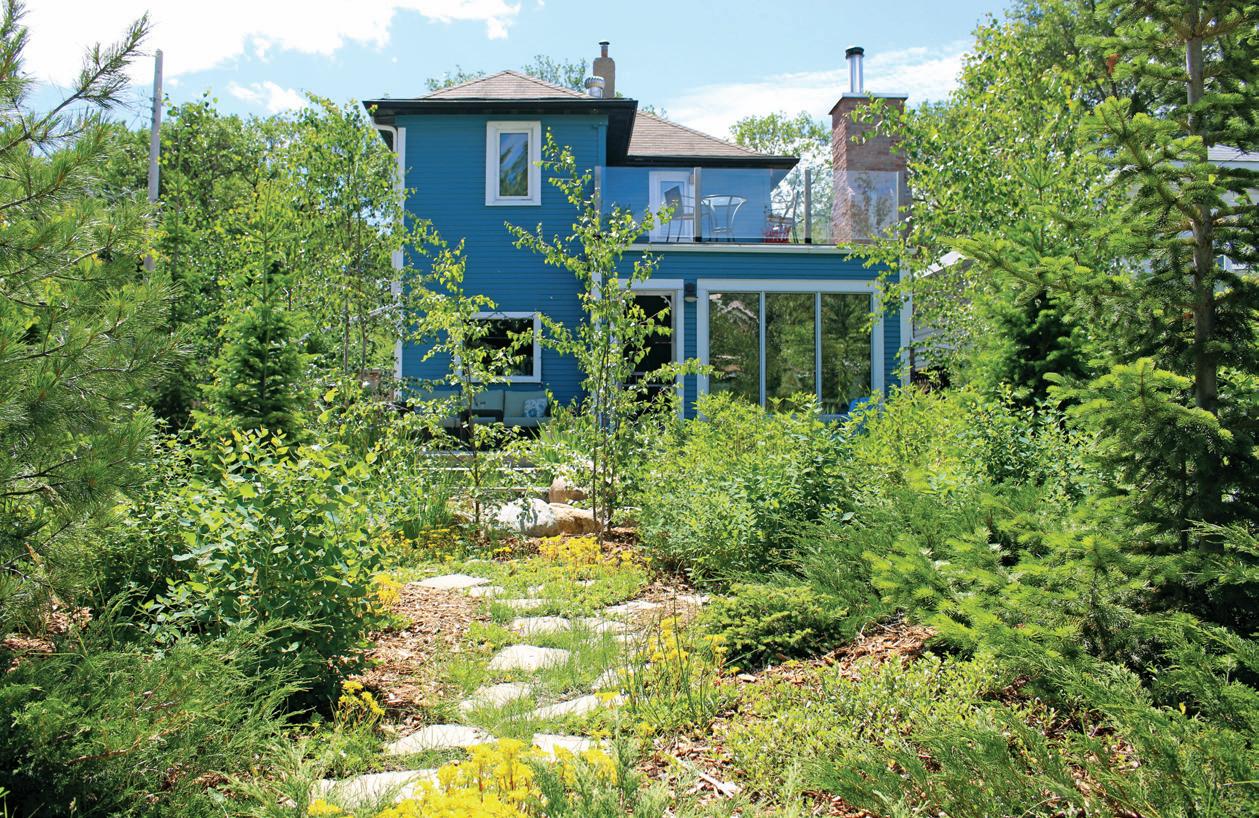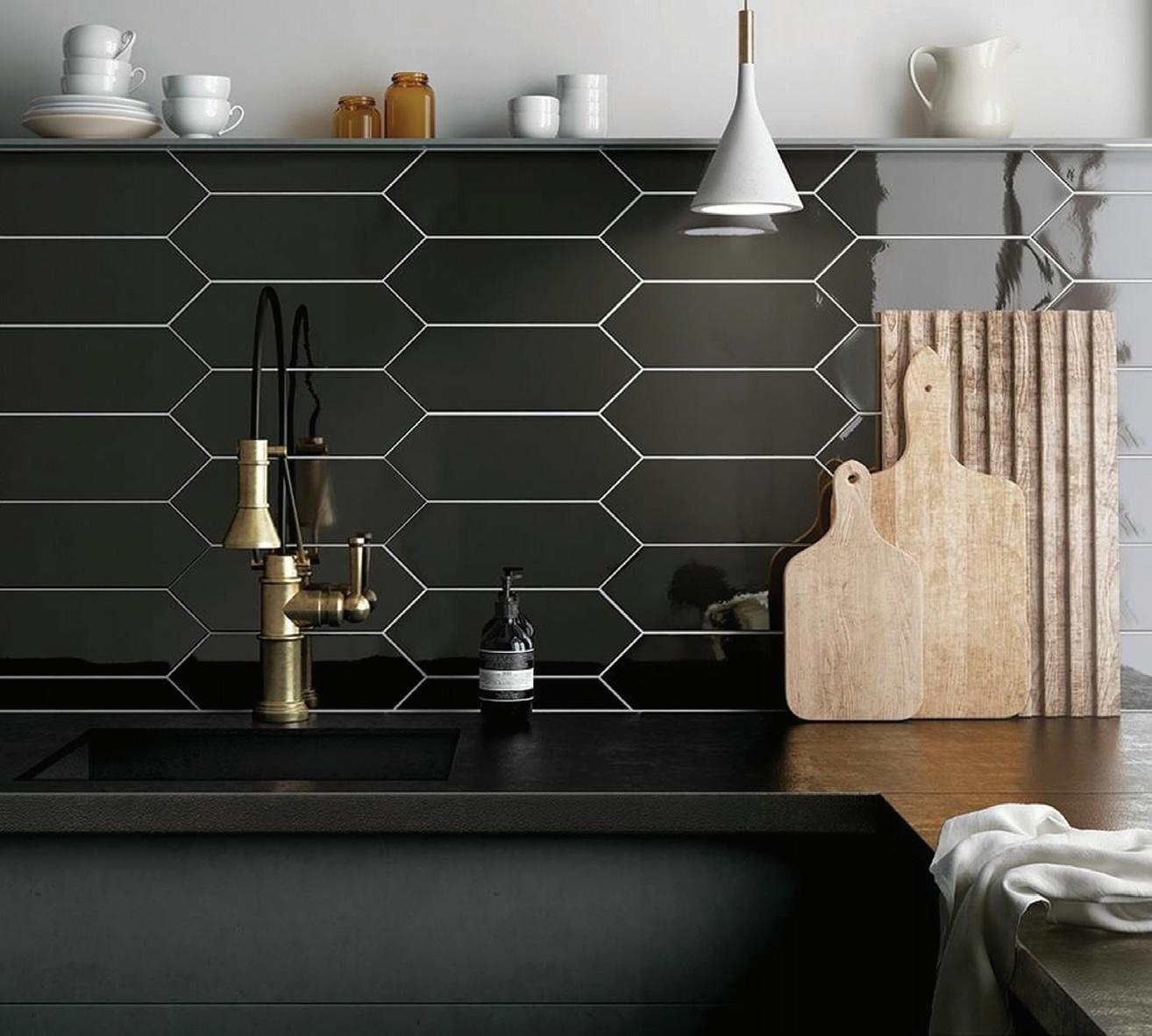


Blending black and brown tones hits all the right notes; wood veneer, white accents and textured backdrops provide warmth and contrast in this moody Greenbryre home.








Blending black and brown tones hits all the right notes; wood veneer, white accents and textured backdrops provide warmth and contrast in this moody Greenbryre home.




We begin 2023 with a publishing milestone for Saskatoon HOME magazine— 15 years! With the first issue of Saskatoon HOME rolling off the presses in Spring 2008, the magazine has grown into the successful long-standing local publication you see today. Thank you all for sharing so many interesting homes, yards, décor, and stories over the years with us and our readers.
In this issue we have filled the pages with fascinating projects, from local Saskatoon people, following their own passion and love for their homes. Inside we showcase a corner lot tulip display that will soothe your soul. In contrast, have a look at a dark and dramatic décor showstopper in Greenbryre. Learn about the historical spring river break-up and the city of mud that Saskatoon’s early citizens endured. Follow a renovation journey that brought a 115-year-old home back to its original glory in a new part of town. Enjoy some delicious and verdant St. Patrick’s Day dishes from Maureen’s Kitchen. And speaking of verdant, have a look at the evolution of the glorious urban forest that is a Saskatoon hallmark.

The magazine landscape continues to evolve and we have seen many changes to the industry since 2008. It has not always been easy, but we are grateful for the support of our loyal advertisers, our talented team of writers, photographers, editors and designers, and Saskatonians who so generously share their stories. For us here at Saskatoon HOME, there is no doubt it has all been worth it. We love our HOME, and we can’t wait for the next chapter.
Thank you for all your support over the last 15 years, and we hope you join us for another 15.
Sincerely,
Amanda & Rob Soulodre
CELEBRATING YEARS 15
Issue 61, Spring 2023
ISSN 1916-2324
info@saskatoon-home.ca
Publishers
Amanda Soulodre
Rob Soulodre
Editor
Karin Melberg Schwier
Contributors
Eymeric Widling
Jeff O’Brien
Julie Barnes
Karin Melberg Schwier
Lillian Lane
Maureen Haddock
The booking deadline for advertising in the Summer 2023 issue is April 21, 2023
Contact Amanda for more information.
Email: amanda@saskatoon-home.ca
Phone: 306-373-1833
Text: 306-717-0663
Saskatoon HOME is printed four times a year. Subscribe to receive every issue direct to your mailbox for $20/year. Visit www.gethomemagazine.ca
Connect with us: www.saskatoon-home.ca
www.facebook.com/saskatoon.home /saskatoon.home
Saskatoon HOME is published by: Farmhouse Communications
Telephone: 306-373-1833 info@saskatoon-home.ca www.saskatoon-home.ca
No part of this publication may be copied or reprinted without the written consent of the publisher.
Publications Mail Agreement # 41856031









It was a serious car accident in 2020 that led Michael Szafron to appreciate the healing power of flora. Gardening was something he could still do as he recovered from his injuries. “I could plant some flowers,” he thought. Then things got out of hand.
The Back Story
Former Riversdale residents, Michael Szafron and his partner Clinton Ekdahl, bought the property on the corner of University Drive and McKinnon in Varsity View in 2014. The home was built in 1912 and was originally named the W.E. Walter House. Clinton,
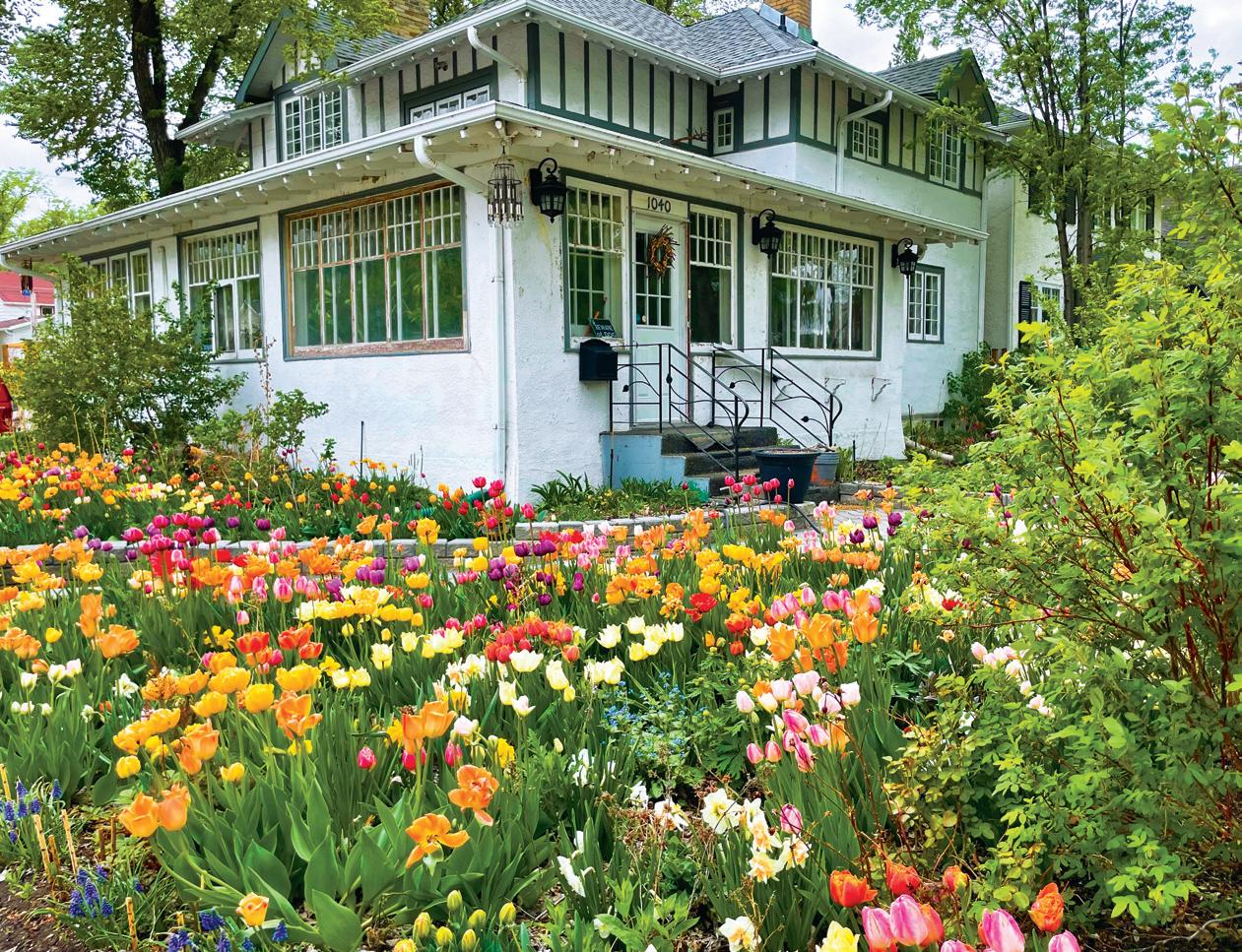
a history buff, has been researching the house and former tenants, and hopes to earn provincial and federal heritage designations.
Michael and Clinton applied for, and in 2016 received, Municipal Heritage status for the house. As part of the designation process, they had the house renamed the
STORY KARIN MELBERG SCHWIERMann House, after Owen Mann, one of its notable residents.
“We fell in love with the house the moment we walked in,” says Clinton. The original mahogany woodwork, crown moulding, coffered ceiling and so many pristine original features sealed the deal. But the grand old house
needed a lot of attention.
“Basically the first five years were spent making the place livable,” Michael says.






What to do with the overgrown yard was a daunting question. “We took out probably 40 trees, old wormy apples, Manitoba maples; volunteers had sprouted everywhere. You could stand in the backyard
at noon and not see the sun.”
Once the trees had been thinned out in 2015–16, a fence was added the next year. They chopped and stacked wood and thought some flowers would be nice. Six truckloads of topsoil were brought in and plans were hatched about stone pathways, retaining walls, a centre courtyard with a gazebo.
That fall, Michael planted 300 locally purchased tulip bulbs on the east side of the house. They liked the idea of hosting pollinators; Clinton disliked the monoculture that is grass. They put some thought into what else they’d like to grow, colour schemes and pollinatorfriendly flowers.


In late summer 2020, the pandemic was well underway, so Michael and Clinton were staying close to home. Tragedy struck in early August when Michael was in a car accident. As he began to heal and recuperate, they made a connection with a wholesale horticultural nursery in British Columbia that, well, got the “bulb” rolling. With time on his hands—and knees—realizing that the planting stance was pain-free for him, Michael began ordering. They planted, and planted, filling the front, side and back yards with thousands of bulbs, rhizomes and seeds. Over 3,200 tulips (mostly) and daffodils were planted in Fall 2020 in the front and


east sides of the house.
The once-overgrown landscape was transformed as Michael took on planting as a way to rehabilitate himself. Another 8,500 tulips (mostly) and daffodils went in during the fall of 2021 in the front yard. The corner lot was well on its way to be the floral mecca of the neighbourhood, if not the city.
One of Michael’s university colleagues had a daughter living in Australia. She came across a photo of a dazzling field of spring tulips and called her mother. “I saw





this on the internet. It says there is some tulip festival in Saskatoon?” It was the Mann House front yard; though not a festival, it is festive, and it does attract a lot of attention.
Flower Power
Regular visitors include residents of the Luther Tower seniors’ complex, and people visiting family and friends at the


nearby hospital stop for a bright pick-me-up. Besides passers-by who stop with enthusiastic compliments, there are thank you notes in the mailbox. One admirer gave Michael and Clinton a needlepoint of the Mann House festooned with tulips.

Some of the shared passerby stories are poignant. Health care workers, during the worst of the pandemic, would stop to see the flowers to “get centred” before their shifts. Some would stop after work to decompress before they went home to their families.
One woman and her husband would often stop by; the husband had been an avid gardener but had to give it up because of failing health. Dementia had taken
his speech, but stopping at the Mann House seemed to spark his spirit. His voice would return, his wife said, and they could have a conversation, even for a short time, in the presence of the flowers.
When Michael and Clinton began to transform their property, they had no idea the impact it would have. Besides being a literal healing journey for Michael after the accident, the flowers have had a lifealtering impact on others. Many passersby shared the positive impact that visiting the garden has had on the mental health of visitors.

“There’s one story we feel profoundly privileged to have been given,” says Michael. One visitor shared a struggle with severe depression. Just walking
by to visit the garden had a literally life-saving effect. There were buds yet to open, the bees and hummingbird moths were at work. The flowers offered hope.
“One day that person saw
me planting more bulbs and decided to see what would come up in the spring.”
That person still comes to see the flowers.
Karin Melberg SchwierAS OF AUTUMN 2022, MICHAEL AND CLINTON’S FLOWER COLLECTION INCLUDES:
11,000 tulips and daffodils (that’s not a typo)
1,200 lilies
2,500 gladiolas
125 day lilies

65 bee balms
25 lupins
25 balloon flowers
25 anemones
175 hostas
125 iris
50 astilbes
75 sedum
15 peones
100 dwarf allium
25 giant allium
25 globe thistle
A sea of ornamental poppies on the MacKinnon Street boulevard. They call it “Flanders Fields”.








“Dark and modern, with a touch of industrial.”
That’s how the owner of this layered and luxurious Greenbryre home—built by D & S Homes—described his vision for the space to Curtis Elmy and Trevor Ciona, the principal designers and owners of Atmosphere Interior Design.
“When we first met him, he told us he loved black,” says Curtis. Otherwise, their client “was very open to us guiding him. He gave us a lot of flexibility.”
The home’s pièce de résistance is arguably the dark and dramatic
kitchen, where balancing the black with warm wood cabinetry was key to the rich, layered look.

“Black can be a hard material to work with, because on its own, it can fall very flat and heavy,” explains Curtis. The cabinets are clad in a dark brown wenge
(pronounced wen-gay) wood veneer, which strikes a contemporary note, thanks to its linear grain.
Blending the black and brown tones “just worked,” says Curtis.
“When you’re working with a lot of black, you want to make sure that there’s some warmth in
some other elements, so that it doesn’t become overwhelming.”
White accents provide contrast and punctuate the space—from the industrialstyle pendant lights, to the veining detail in the black marble backsplash. “The reeded glass in the cabinet doors also feels light so there is a white component, but it’s not in your face.”
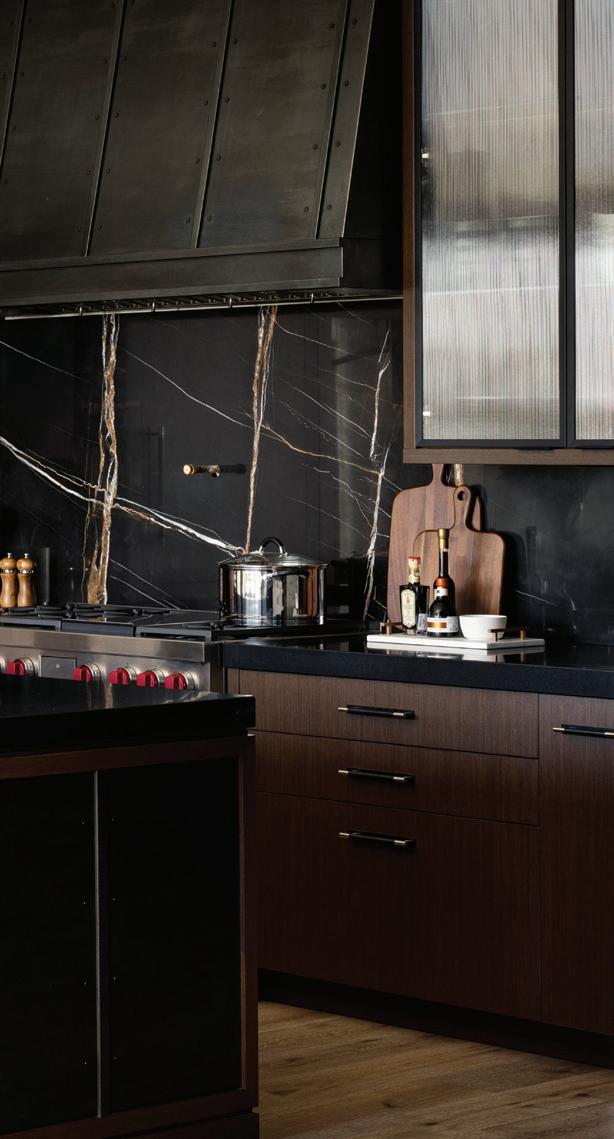
Tucked behind an
inconspicuous pocket door is a butler’s pantry, which leads to a covered, outdoor kitchen complete with a barbecue and smoker.

“It’s going to be a wellused kitchen,” Curtis adds, explaining that the homeowner, an avid cook, loves to host family and friends.
The same tones and materials can be found in the ensuite, which




makes a bold statement through symmetry the moment one steps inside.
A matte black freestanding tub is anchored by a slatted oak floor-toceiling feature, stained to match the floating vanity, and the wenge-fronted millwork throughout the home. Smoked glass doors to the water closet and shower visually bookend the tub, while a marblelook porcelain tile lining the walls and floor creates a dramatic backdrop.

“Porcelain has come a long way,” says Curtis. With a higher-end product, you get “multiple visuals, so when you’re looking at it installed, you don’t see the same tile repeated—and that gives you more of that authentic marble look. It’s really hard to copy nature, but a lot of companies are doing an amazing job.” He adds that due to its maintenance-free nature, it’s often the more practical choice over marble, as it doesn’t need to be sealed and resists staining.
Lighting plays a big role in their design process, says Curtis. It’s the hidden details, like the lights tucked under the mirror and vanity that “make a room come alive,” he says. “In the winter, it’s dark here, so you want these rooms to have warmth.”
With the shower room light glowing behind the smoked glass door and the ambient vanity lights, the ensuite “looks amazing at night. It really takes on different feel.”
At the project’s outset, the homeowner said he wasn’t into wallpaper. “And now we have wallpaper
everywhere,” says Curtis. “There’s no hiding it, we are wallpaper guys. All of our projects have a wallpaper or two in them.”
A statement-making laser-cut cork wallpaper covers the walls in the main floor powder room. Black and brown with a gold metallic inlay, it perfectly echoes the home’s colour palette.

Suspended above the vanity is a sculptural pendant light. While delicate looking, it also lends an industrial look to the space. “The black metal has a patina, so it’s not perfect— when it’s lit up it just looks so cool,” says Curtis.
Downstairs in the guest bathroom, a black and grey vinyl grasscloth-look wallpaper gives the room a rich texture, something Curtis says is needed when creating a monochromatic space like this.
“I think we’ve converted him” into a wallpaper guy Curtis says about the homeowner. “I think when used correctly, everybody falls in love with it.”
He explains that wallpapers have come a long way. “It’s not your grandmother’s wallpaper anymore, that’s for sure.”
As a case in point, just around the corner from the guest bath, a grasscloth-look vinyl wall covering wraps the walls on either side of a sleek and sophisticated bar. Hand-embellished copper rivets in the paper add dimension to the space, while the black faux-brick backsplash adds depth and texture.
Curtis wanted durable wallpaper for the bar “because it’s a heavily used area for mixing and liquids. We had the wallpaper
company do a custom run on vinyl, which is super durable. If someone is using the margarita mixer and they spill, you can wipe it.”
Commanding Quartzite
A striking quartzite clads the bar tops, and waterfalls on either side of the peninsula. Curtis and Trevor also decided to use the quartzite for the door jambs on the entrance to the walk-in wine room. “It’s one of those materials that is so striking that you have to use a lot of it, so that you can appreciate the movement of the veining detail.”
The wine room is tucked under the stairs—a space originally planned for storage. “The door was only supposed to be on one side, but we came up with this
idea to open it right up so that you could see it when you were downstairs—it helps to balance off the bar area,” says Curtis. The same smoked glass from the ensuite delineates the wine room, and “when it’s lit up at night, it just has this moody appearance.”
A few steps from the bar, the entrance to the gym commands attention. Smoked glass panels separate the gym from the adjacent sitting area, while the same richly veined quartzite from the bar beautifully frames the double doors.

A “Nordic-spa inspired dry and wet sauna” sit adjacent to the gym.
“I love seeing people being able to incorporate those things that have been on their list for











years into their home,” says Curtis. “The power of loving your home is important. If you can afford it and you can fit it into your floor plan, and you know you’re going to get great use of it, it’s amazing.”
“Dark, modern, with a touch of industrial” is a vision Curtis and his team feel they delivered on. Having an open-minded client plays a big role in the success of a project like this.


“If you’re going to go in close-minded, you’re not going to get an outcome that is special,” he says. “I think you often have to
be open to try something different that’s outside of your comfort zone. Great athletes often say to be nervous is not necessarily a bad thing."
After their client had outlined what he was looking for in the design of his new home, Curtis and Trevor methodically made a plan. "Our goal is to take all of the wants from a client and give them a version of that, but twist it a little bit, so it’s an interesting mix of all the things they like, and then something that they would never have thought of.”

When Sally Mitchell and Larissa Kiesman said “I do” to their North Park home three years ago, they had an idea that it was the start of a beautiful relationship. It’s a match that has refreshed a 115-year-old house; a two-year renovation stripped away a sad and tired 1980s feel and rejuvenated this gem to its original sparkle and

charm. And the couple also made some new discoveries about their home’s past.
The Alexandra address wasn’t always the domicile marker for Sally and Larissa’s house. Another dwelling used to occupy this spot; it was called the Witney House and was cut from its
foundation and moved to a corner lot on the same street.
In turn, Sally and Larissa always thought their 1907-era house was moved onto the property having previously occupied a lot on Spadina Crescent. They had made guesses about where it might have once stood, basing hunches on nearby architecture.
In the 1980s, the house was converted into a group home for people with intellectual disabilities and unfortunately—for not only the residents but for the house itself—it took on an “industrial, institutional” pallor. There were seven bedrooms for at least that many occupants over several years.
Larissa grew up in Asquith, but had been a resident of the North Park neighbourhood for ten years before purchasing the house. Because of its grand stature amongst the war time homes, she had her eye on the property for some time. In 2018 she and Sally knew it had the perfect bones to become the home for their blended family that included

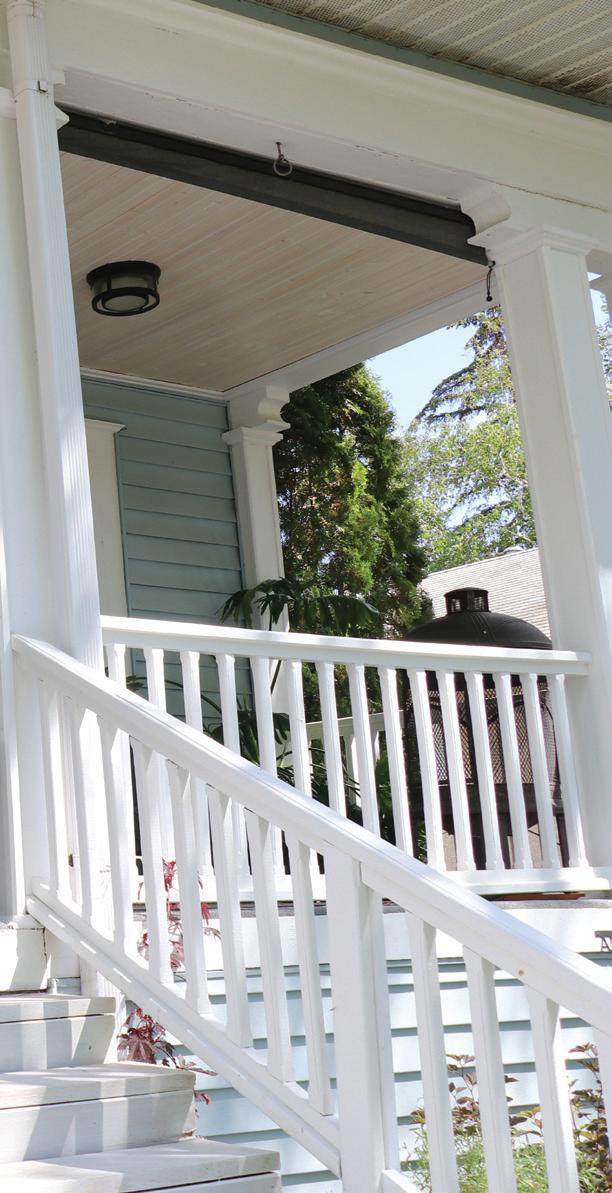
five girls between the ages of seven and 15. They decided the house needed their mob and it deserved another chance.
“We got our hands on this poor sweet sad dated-to-theEighties beauty three years ago.” Eighties fashion was questionable, not only in hair and clothes but evidently also in some home decor






 A two-year renovation brought the house back to its original charm.
In keeping with the 1907 build, damaged flooring was replaced with oak.
A two-year renovation brought the house back to its original charm.
In keeping with the 1907 build, damaged flooring was replaced with oak.
choices. While Larissa always felt there were possibilities, the couple spent a lot of time convincing each other there was indeed potential in there somewhere.

“It’s such a beautiful house, but it was so unloved and mistreated,” says Sally, a marriage commissioner and owner of Your Ever After. “A neighbour told us they basically couldn’t give his house away a few decades ago.”
A year after they joined forces, a two-year overhaul began. It meant working on every single square foot of the property. They were determined to bring back and reveal its “glorious character.”

“We did most of the work ourselves,” says Sally. “Except for plumbing. We learned early on that is not our strong suit.” They were intent on keeping or replicating as much of the original character as possible.
“We still mostly have all the original windows. The one we did have to remove,
we made into a hutch with help from a neighbourhood carpenter. The replacement looks like the original. We tore out a million feet of carpet. The hardwood couldn’t be restored, but we put in oak. We painted using colours to match the historical timeline and refinished the stairs to the original oak.” Two tiny upstairs rooms became a spa bathroom. A “tired old” fireplace with a trophy display case surround was refurbished.
“People are always commenting on how beautiful it is,” says Sally. “Even though it doesn’t really fit in a neighbourhood full of wartime bungalows. Infills are coming, but still it doesn’t look quite right because it’s an import.”
Sally was still intrigued. Where it once stood was based on a neighbour’s belief that it was moved from Spadina, “somewhere near Queen Street.” They only recently learned the real


story. Enter City archivist Jeff O’Brien, who managed to pinpoint the original location at 324 20th Street East on the corner of 20th and Fourth Avenue. The house was moved to Alexandra on October 14, 1956.

Jeff not only discovered where the house once stood, but also unearthed photographs of the move and details of the owner, physician Herbert Dulton Weaver. He lived in the house for nearly 40 years from 1908 to 1942. After the Weaver house and one next door were both moved, a Royalite service station was built on the corner.
Originally from England and once a lecturer at Dalhousie Medical College, Weaver came to Saskatoon in 1905. He was deeply concerned with the “welfare” of the city and the first

meetings for both a fledgling YMCA and a horticultural society were held in his home. As a horticulturalist, he was active in the “beautification of Saskatoon,” and created one of the first nurseries in northern Saskatchewan. He experimented with trees, shrubs and perennials hardy to the prairie climate. He was long-time member of the Parks Board; Weaver Park in the Exhibition area was named for him in the 1950s. In Halifax, Dr. Weaver installed the first X-ray equipment in Nova Scotia, and he was the first to introduce the X-ray to Saskatoon.
Sally and Larissa are thrilled to have the details and Dr. Weaver’s photograph provided in his Star Phoenix 1942 obituary, and with the photographs that show their house on the move down Saskatoon’s streets.


Whether it’s breathing new life into tired homes, or building your dream home from the ground up. Bella Vista’s experienced team does it all in record time, with minimum disruption, by strongly connecting with your vision.
It looked a seemingly impossible feat for a small Westside Building Mover’s truck, dwarfed by the house on a trailer behind and men perched on the uppermost peak.
“One of the things that’s so great about learning this new information is that Dr. Weaver was a pioneering physician, some say revolutionary. In the same vein, Larissa is a doctor with a deep concern for the welfare of Saskatoon residents. Like Dr. Weaver, she also works on 20th Street.” How’s that for a nice coincidence?
In her work as a marriage commissioner, Sally specializes in “non-traditional” unions, couples who have been married before, who might
be blending families, those with interfaith relationships, couples who are non-binary, gay, trans, anyone “who falls anywhere on the rainbow.”
The house, proudly refurbished and restored, adds its own admirable diversity to the North Park neighbourhood. It’s been the much-loved “sacred space” for many unions that Sally officiates.
“I host small weddings here now that the renos are all done,” she says. “The verandah and interior are beautiful for photos. We love our home dearly and I think people who celebrate new unions here feel that, and understand this house too has become what it was meant to be.”

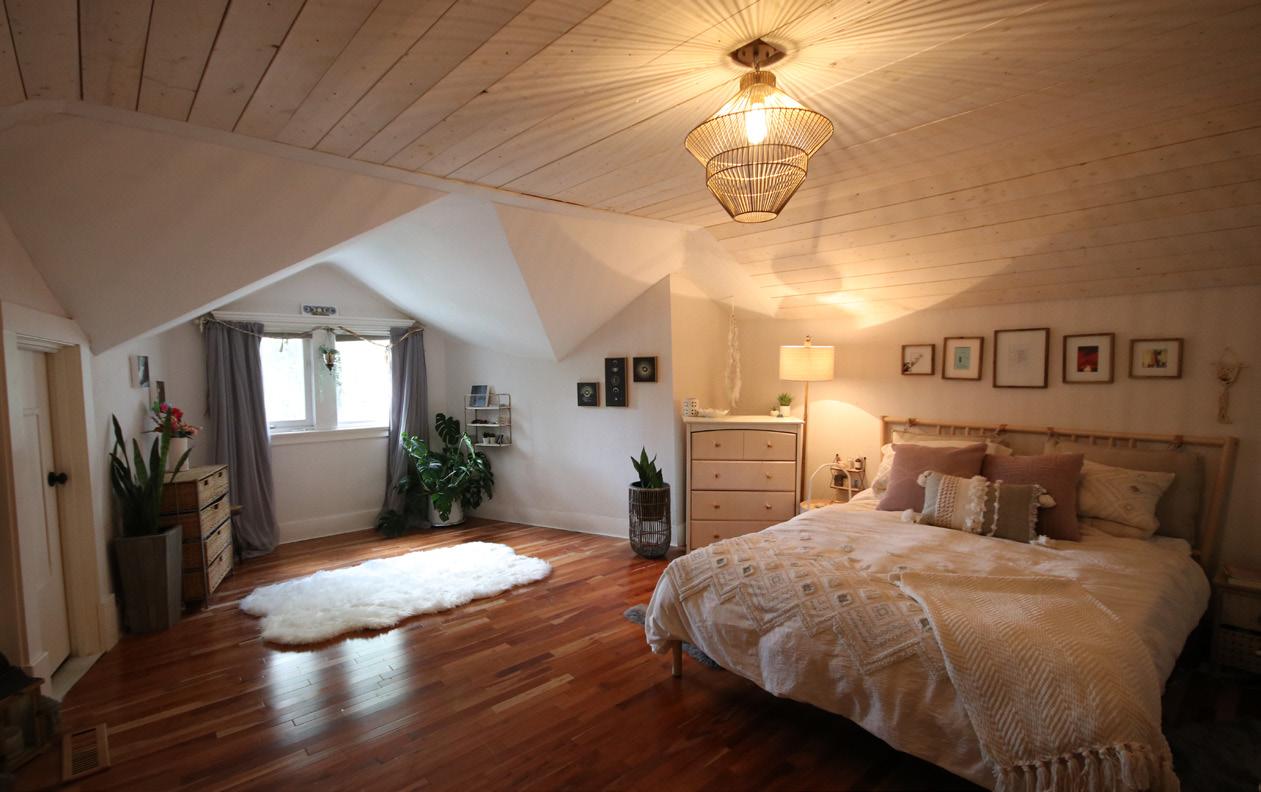







You can’t have spring without mud. It’s not so bad now that the roads are paved and the alleys are all graveled. But this is a comparatively new development. Back in the days of Saskatoon’s great expansion in the 1950s and early ‘60s, the streets in the fringe districts were still mostly earth-surfaced. When spring arrived, the thawing earth turned them into boggy, impassable mires. Sidewalks were usually the first bit of streetscaping to be installed in new areas, sometimes even before the
streets were graded, and drivers frequently took to them to escape the soulsucking mud. Or they parked blocks away and walked in.
Urban Submersion
And if it wasn’t the mud, it was the water. Come spring, low-lying areas of the city turned into lakes, dotted with little islands where homeowners watched and worried about their basements caving in. Mayfair, North Park and King George were particularly prone to flooding in the early
days. As the city expanded after the Second World War, we added new trouble spots in places like Varsity View and South Nutana.
A problem was that we tended to fill in the low spots so we could build houses on them. The land on which Saskatoon now sits was once potholed with sloughs, with drainage channels and ravines running down into the river. But we filled in the ravines and leveled the sloughs, leaving the water with no place to go. To combat this, we dug
BY: JEFF O’BRIENdrainage ditches and later, storm sewers. Every spring there was a flurry of activity as City crews worked to clear the ditches and thaw out the storm sewers, using coal fired “steam wagons” to melt the ice in the catch basins so they’d drain properly.
But storm sewer construction always played catch-up to residential growth. And even where they did exist, they sometimes weren’t enough. This is true even in modern times. A fast thaw, a late snowstorm and heavy

rains can overwhelm even the best designed systems. Most long-time Saskatoon residents have at least one story about watching people paddle canoes down city streets.

Nowadays, instead of filling in the sloughs and wetlands, we incorporate them into new neighbourhood design as a way to help prevent flooding. An even newer innovation are the “dry ponds” the City is building in flood-prone older neighbourhoods. These are designed to collect water that would otherwise pour onto the streets during intense rainstorms. The first of these, in W.W. Ashley Park, opened in the fall of 2022. Eight more are planned.


The first, most-eagerly awaited sign of spring in Saskatoon was always
the Spring Break-Up, that moment when, with an almighty “Crack!” that could be heard across the city, the ice on the river broke and started to move downstream. “The Big Show!” the newspaper called it, an “annual treat” as people crowded along the bridges and riverbanks to watch the great masses of ice tumbling downstream with the spring thaw.
But the spring break-up also caused problems. In the very early days, the winter ice regularly took out the old railway bridge (where the Buckwold Bridge is now). This was the only way across the river and in 1904, travelers in Saskatoon were stranded for weeks while they worked to fix it and repair the line between here and Regina. Ice dams downstream could also exacerbate the spring
flooding. The worst year on record was 1908. At their peak, flood waters that year were so high they eroded the riverbanks behind the Traffic Bridge abutments and lapped against the underside of the bridge deck itself.

Thanks to hot water pumped into it from the Queen Elizabeth Power Plant, the river here no longer freezes solid, and so the spring break-ups (like winter ice roads) are nowadays things of the past.
The Spring Clean-Up Campaign


The other fun consequence of living in a place that gets 36 consecutive months of winter each year is the accumulation of garbage on our streets and lanes. This isn’t a new problem here, and like the spring break-up, the official spring clean-up was once an annual tradition
in Saskatoon.
Even today, Saskatoon can look pretty rough when the snow melts. But compared to 1907, we’re amateurs. That year, the newspaper warned repeatedly that the “frozen heaps of garbage and slops” littering the city, along with piles of manure and nightsoil
cleaned from privies would soon start to melt, with dire effect on public health. Stung to action, Saskatoon launched a city-wide clean-up campaign that saw nearly 250 wagon loads of garbage hauled from yards and lanes and taken out to the nuisance grounds.

The spring clean-up campaign became a yearly ritual as we worked together to clean up winter’s accumulated wreckage. City crews hauled rubbish from the streets and lanes, cleaned up city properties and took away rubbish brought out from people’s yards
Tailor





YOU CREATE THE ULTIMATE HOME RETREAT. WE’LL PROVIDE
The Carrier® Infinity® system delivers premium comfort and energy-saving performance.
your indoor comfort to your specific needs with a complete Carrier® Infinity® heating and cooling system and Infinity air purifier. It features occupancy-based temperature control and zoning capabilities, innovative filtration for healthier air and over-the-air software updates that help optimize performance. So however you use your home, you can count on Carrier to make it comfortable. Learn how it works at carrier.com/purifier.
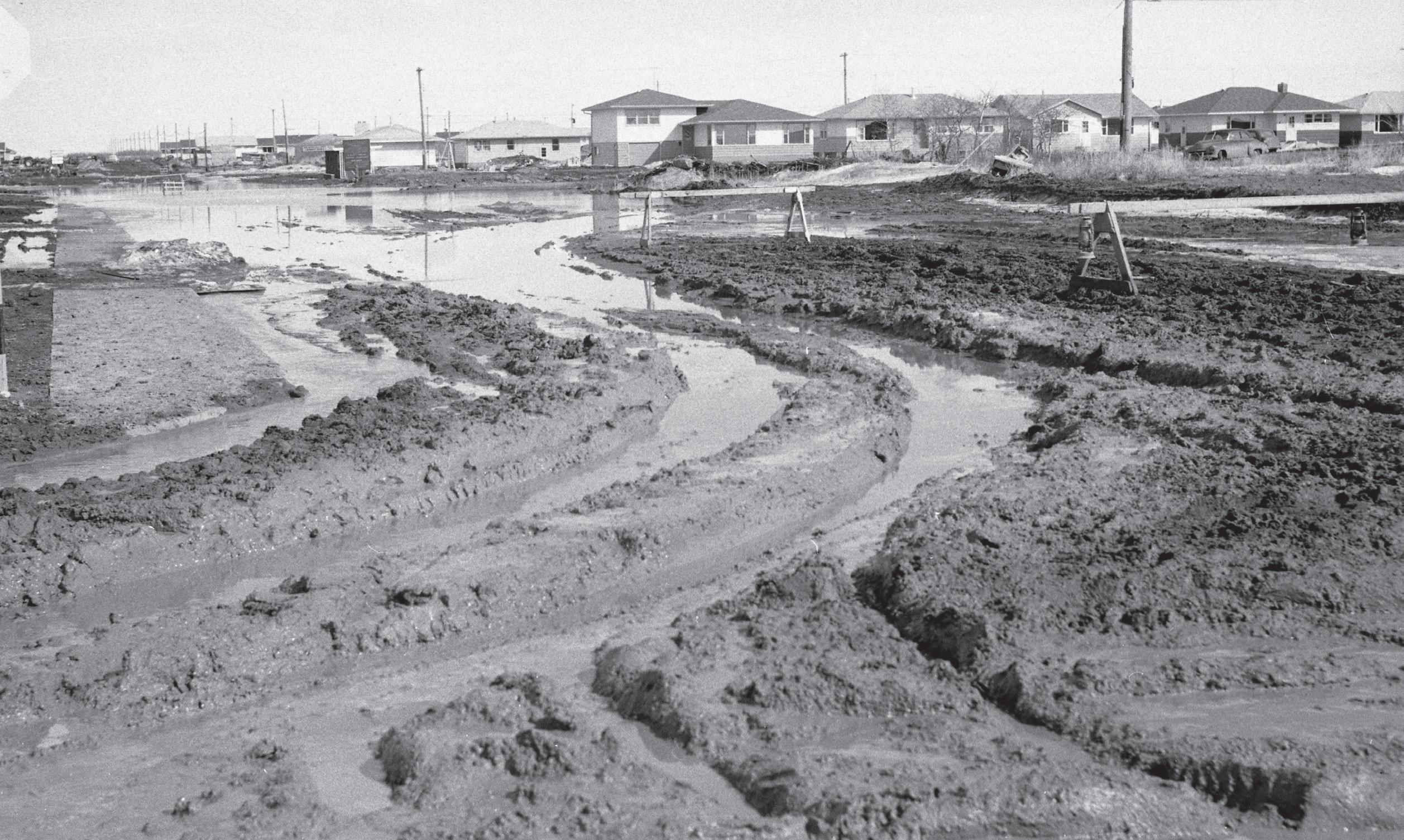
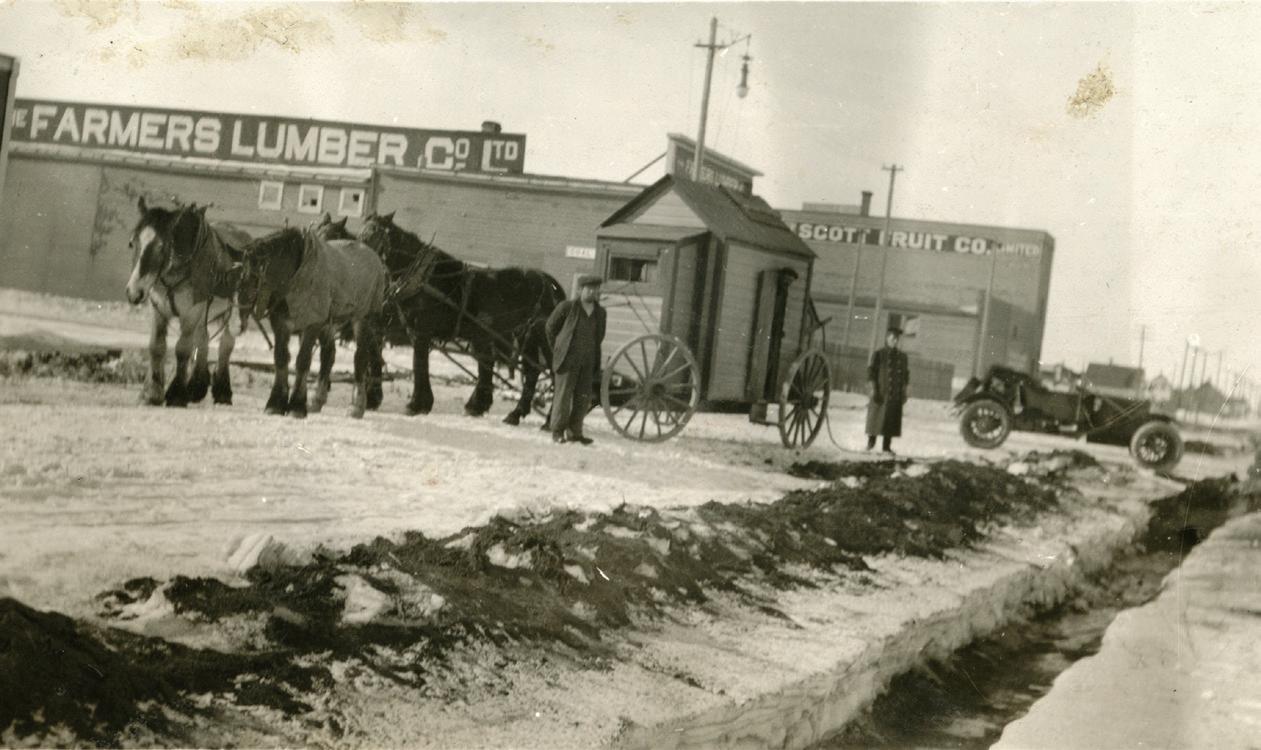
and basements.
Partly it was about civic pride, the attainment of “a beautiful and homelike city” as the newspaper noted, reporting on the campaign in 1913. To that end, people were also urged to do needed repairs. A new coat of paint, new boards on the fence—the kind of work that keeps a city looking neat and clean, and organizations like the Kiwanis Club once sponsored contests to identify Saskatoon’s best kept streets.
But it wasn’t just about keeping Saskatoon pretty. A clean city was a healthy city, and Saskatoon’s
Medical Health Officer was a staunch proponent of the spring clean-up. As an added incentive to residents, inspectors from the City Engineer’s office and the Fire Department also fanned out across Saskatoon during the clean-up, and the Health Department was kept busy thereafter sending out notices to property owners.
One such warning, sent to a Nutana homeowner in 1942, noted among other things the accumulation of manure over the winter, “the whole causing a generally untidy and dirty condition of the property.” Indeed.
Flies were high on the Medical Health Officer’s hit list. One goal of the spring
clean-up was to remove their breeding places before they could multiply in the warm weather. Of particular concern were back yard privies, which health authorities waged war on here for decades. In 1923, nearly half of all Saskatoon homes lacked running water. By the 1960s, there were still thousands of these “unmodern” homes here, where water was delivered by the barrel and toilet facilities consisted of a little house at the back of the lot next to the alley. These were cleaned out by city scavenger crews through a hinged flap at the back. In the winter, they sometimes had to be pried
open with a crowbar, often breaking in the process, so that come spring, they swarmed with flies.
With no handy drain to pour them down, cooking slops and other, less pleasant wastes, were often disposed of by heaving them out the back door. There, they would accumulate over the winter, turning the yard into a germ-infested morass come spring. To combat this, health officials recommended pouring liquid waste into a wooden frame in the back yard where it would freeze, rather like a small, lumpy, backyard skating rink. In spring, the ice could be broken up and hauled away before it melted.
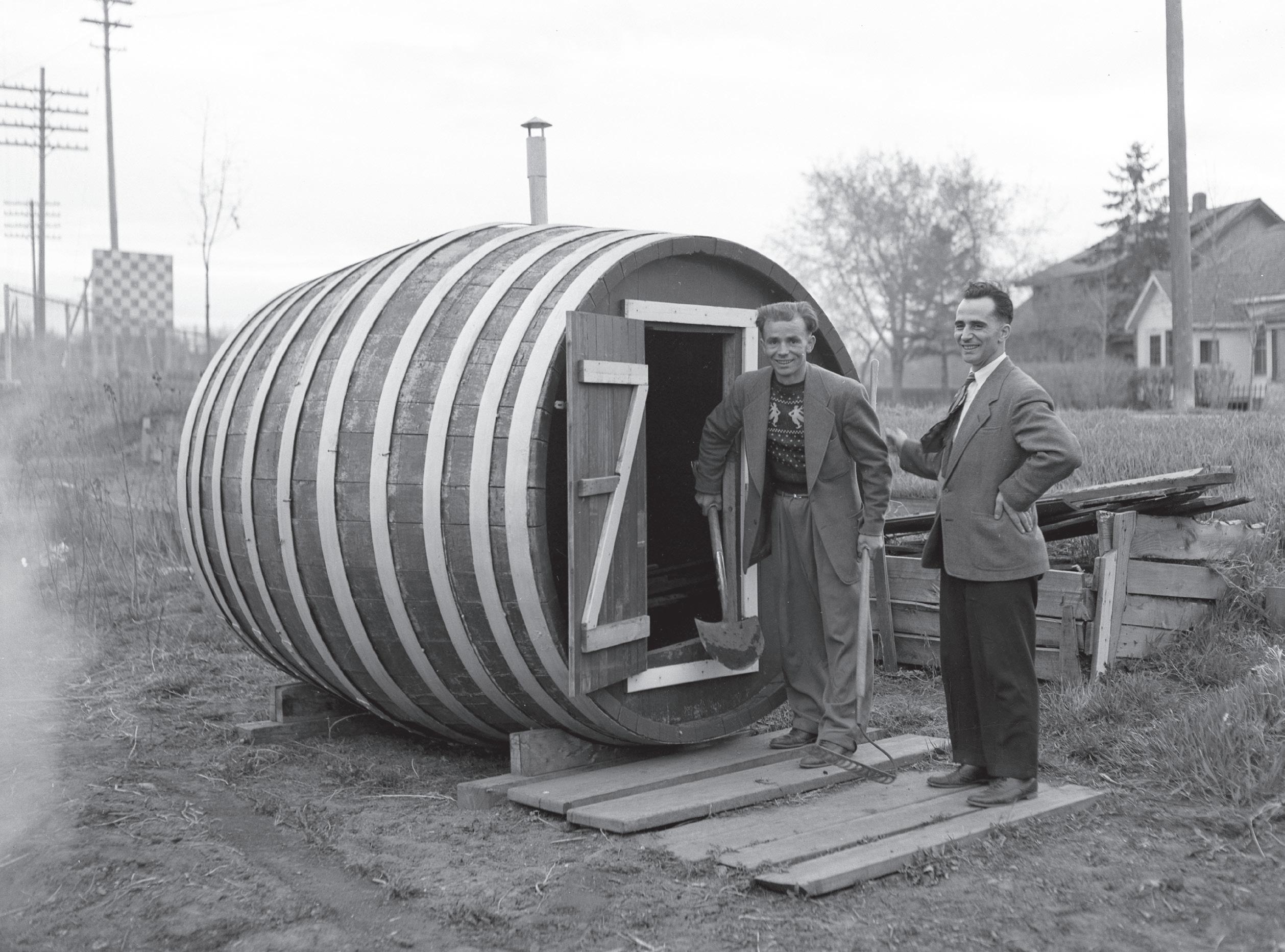
There are still those who dump old furniture in out-ofthe-way places, or who can’t be bothered to properly secure their loads on Circle Drive. But the anti-litter campaigns of the 1960s and ‘70s really did make their mark, and Saskatoon today is a far, far cleaner place
than it once was. Even in spring, when it sometimes looks like it was hit by a very messy bomb.

The City does its part— sweeping the streets and cleaning up Circle Drive every year. The community associations also sometimes sponsor back alley clean-up campaigns (with help from the City). But
the city-wide appeals for everyone to pitch in—to fix up and clean up—are a thing of the past. We each attend to our own parts (to a greater or lesser degree) but for the rest of it, we seem to have decided that the winter accumulation of garbage is Somebody Else’s Problem which, if we wait long enough,
Somebody Else will clean up for us.
It may be that the time has come again for each of us to take responsibility for the city we live in, working together to make it a better place for everyone
Jeff









Crossmount is a unique 55+ aging-in-place community located on 400 acres of natural prairies 5 km south of Saskatoon on Lorne Avenue. Five sizes of independent homes are available. Homes are designed for safe aging-in-place with discreet built-in safety features so you can stay in your home as you age. Onsite in-home health services are available if health needs change.
At Crossmount we believe daily choices, no matter how small, contribute to optimal healthy aging. Choosing when to get up, what to eat and planning what you will do may seem like ordinary decisions, but the opportunity to make them is important for wellbeing. Independent living allows you to continue making these decisions. Our pet-friendly community provides the option of sharing your life with a furry companion, while an abundance of unique activities allow you to stay as busy as you wish to be. Camera club, nature club, walking club, mahjong, ice skating, cross country skiing, snowshoeing, walking your dog, spending time in the community garden or greenhouse, going for a bike ride, or socializing with family and friends are only a few of the options you will have at Crossmount.
At Crossmount you can enjoy fresh air and sunshine, listen to birdsong during the day and see the stars at night. For more information about our independent homes and how you can become a part of this community, please contact us at: info@crossmount.ca or 306-374-9890

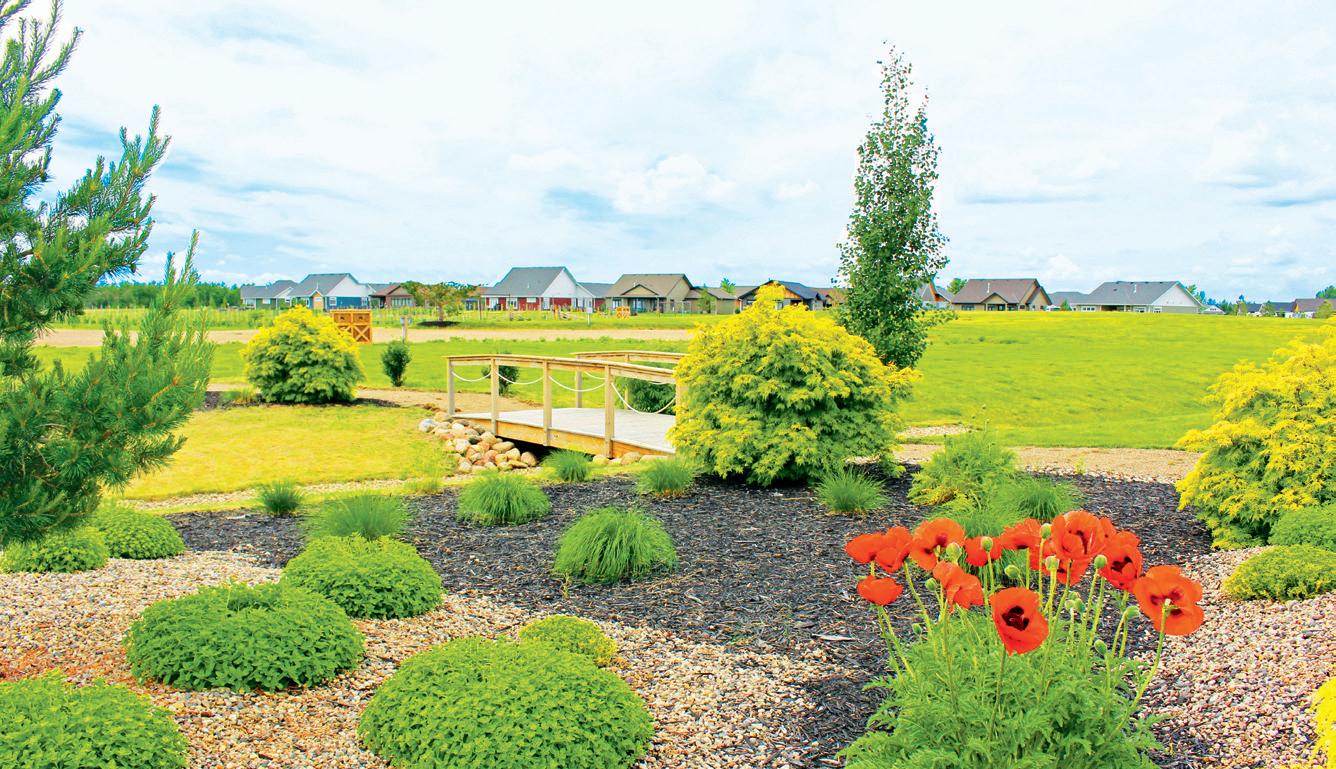
I love celebrating St. Patrick’s Day. When Easter occurs well into April, our first family dinner of the spring happens in March and often has a green theme. A green dinner can celebrate St. Patrick’s Day or focus on the budding of spring.
I start by gathering all the green tableware I already own. I make a list of all the foods and recipes I love that are naturally green, because I don’t want our dinner to be saturated with green food colouring. Children and
grandchildren can help with this planning. Obvious choices for vegetables and fruit include avocados, broccoli, green beans, lettuce, cucumbers, spinach, green grapes, zucchini, pickles, parsley and olives. Some grocery
stores also offer green corn chips and beverages for spring consumption. A good shamrock cookie cutter is needed for this meal. You can cut toast, pastry, or spinach tortillas into shamrock shapes (con't on page 39).

Serve as a meal or as a side.
4 eggs
2 cups chopped spinach, steamed, or 1 (10-ounce) package of frozen spinach thawed and squeezed dry

1 1/2 cups ricotta cheese
1/4 teaspoon salt
1/4 teaspoon pepper
2 tablespoons salsa
Grated cheddar cheese to sprinkle on top
Preheat the oven to 350°F. Lightly coat an 8 or 9-inch pie plate with butter. If you like a deeper quiche, use the 8-inch pie plate. Stir together eggs, cheese, squeezed spinach, salsa, salt and pepper. Pour the mixture into the prepared pie plate, sprinkle with grated cheddar cheese and bake for 35 minutes. Test for doneness by inserting a thin knife. The quiche is cooked if the knife comes out clean.
Let stand for 10 minutes. Serve warm or cold. I usually have pastry shapes in the freezer made from pastry ends after baking pies. Garnishing a slice of crustless quiche with pastry shapes satisfies the pastry lover. It’s one of my personal weaknesses.
Make this recipe your own. What flavours do you like? If you don’t like spinach, this recipe supports two cups of your favourite ingredients.
1. Add two cups of chopped leftover vegetables and meat to the cheese and egg mixture.
2. Add a 10-ounce package of frozen broccoli (cooked), and 1/2 cup of roasted red pepper.
3. Add 1 cup of cooked chicken, 1/4 cup green onions, plus 3/4 cup of corn and a bit of salsa.
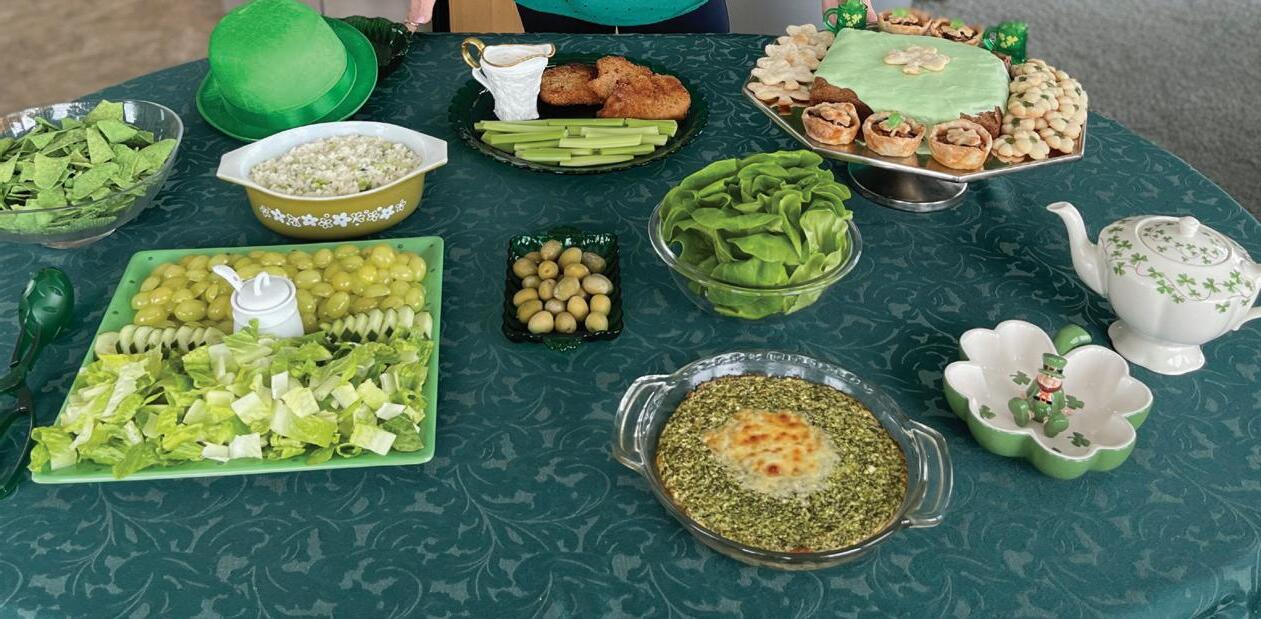
SALAD INGREDIENTS:
1 head romaine lettuce, torn into bite-size pieces
1 English cucumber, thinly sliced
1 cup seedless green grapes, halved
1 can artichoke hearts, drained and sliced (optional)
Combine and refrigerate until serving time.
DRESSING INGREDIENTS:
1/3 cup salad oil
2 tablespoons lemon juice
3/4 teaspoon salt
2 tablespoons fresh or freeze-dried dill weed
1/2 teaspoon ground black pepper
Mix and shake well. Add to salad just before serving or pour into a tiny pitcher and let your guests serve themselves.
Prepare pastry or purchase a pre-made crust. Line a pie pan, and chill until ready to use.
Before making the filling, place the pastry shell in the oven at 425°F and bake for 10 to 15 minutes. Choose a pan that can go from refrigerator to oven for this recipe.
While the crust is in the oven, prepare the filling.
MY FAVOURITE:

Prepare the filling by mixing the following ingredients together.
1 cup ricotta cheese
1/4 cup or more sour cream
2 slices turkey bacon, cooked and crumbled
Pre-cooked mushrooms and shallots, to taste
1 or 2 tablespoons salsa
1 (10-ounce) package frozen chopped spinach, thawed and squeezed dry
1 cup grated, aged cheese, like old cheddar, plus a sprinkle more for the top
4 eggs, whisked until smooth
Once the crust has been partially baked, remove it from the oven, pour the filling into the shell, top with a sprinkling of grated cheese and bake for another 15 minutes at 425°F.
After that time, lower the oven temperature to 300°F and bake for another 40 minutes.
Test for doneness by inserting a thin knife. The quiche is cooked if the knife comes out clean. Cook longer if needed. Leave the quiche on the counter at least 10 minutes before cutting. Quiche can be frozen after it is cooked. Wrap individual quiche wedges in foil before freezing.
To reheat, just place the foil-wrapped quiche wedge on a baking pan and place in a 350° F oven. This should heat in 15 to 20 minutes. If you elect to reheat an entire quiche, be sure to use a freezer-to-oven safe pie plate. Cover with foil and heat for 30 to 40 minutes.
1 cup buttermilk
1/3 cup mayonnaise
1 small clove garlic, minced or a sprinkle of garlic powder
1/2 teaspoon sugar
1/2 teaspoon freeze-
dried dill weed
1/4 teaspoon mustard powder
pinch of freshly ground pepper
2 tablespoons fresh parsley or a sprinkle of dried parsley
In a small bowl or jar, mix ingredients well. Cover and refrigerate for up to four days. This is great on vegetables or meat.

You can also cut your favourite white cake into a shamrock shape and top it with pistachio ice cream. Other desserts can include shamrock-shaped cookies, cupcakes with green icing, green jelly desserts or maybe you have a recipe containing mint or lime like Grasshopper Pie or Lime Cheesecake.
Meat just shouldn’t be green, but you can garnish a cherry glazed ham with green cherries or pour a parsley or dill sauce over a slice of roast beef, pork or cutlets. I have often served spinach quiche or wedges of a green quesadilla.






“The best time to plant a tree was 20 years ago. The second best time is now.”
Saskatoon has long had the moniker “City of Bridges,” but it is also known as the City of Trees, even though only about nine per cent of it currently has tree cover. A recent initiative, the Pathway to a Sustainable Urban Forest,
passed by City Council, spans the coming decade, and aims to increase the green canopy to 15 to 20 per cent of the urban landscape by 2060.
Maintaining, protecting and growing a forest takes a lot of forethought and time.
Homeowners share in the goal of a wider urban forest by planting and preserving their own canopy.
Linda Moskalyk, president
BY: KARIN MELBERG SCHWIERof the SOS Trees Coalition, formerly known as SOS Elms, is, frankly, a tree lover. Linda and the coalition promotes tree planting, the preservation of “heritage trees,” and the education of city dwellers and developers about how trees enhance not only the aesthetics of our urban spaces, but also our mental and physical well being.
“So many of our established neighbourhoods have beautiful large trees. People choose to live in these areas in part because of that; trees are a big draw not only for their beauty but shade and enhancement of property value,” says Linda. “When homeowners cut down a large tree, the entire neighbourhood
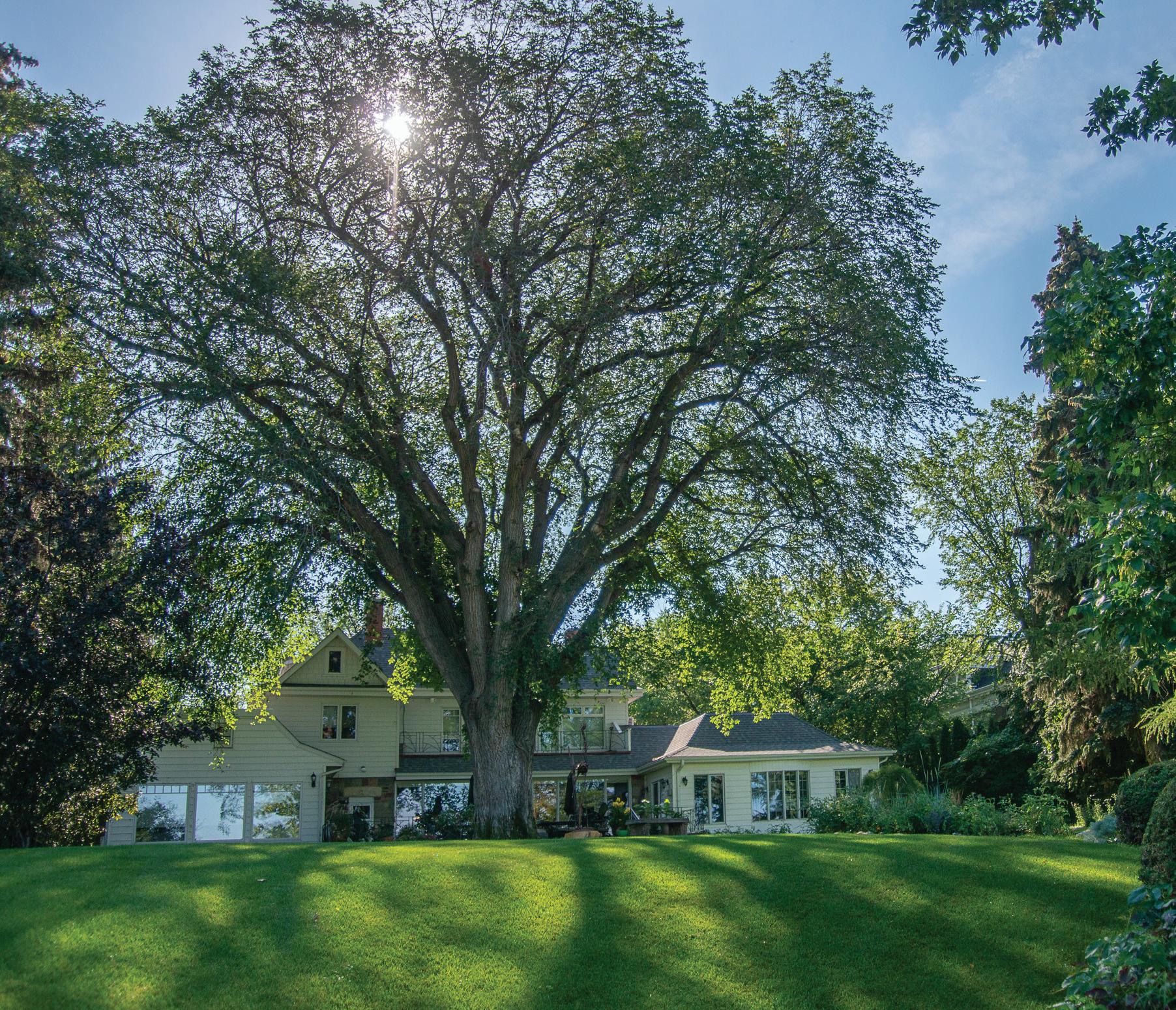
is affected.”
Because much of a city is covered in pavement, a “heat island” develops and temperatures rise as the asphalt, concrete and buildings absorb the sun’s rays. Buildings are close


together and absorb heat, and energy is created by human activity. Leafy canopies, roof plantings and vegetation of all types help to deflect the sun’s radiation and lower the air temperature.
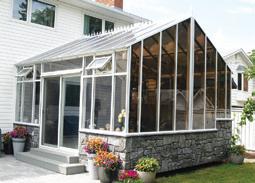


Many new urban areas seem barren despite the efforts of some developers to introduce man-made park areas. Streets are largely void of the leafy treelined plantings that grace

established neighbourhoods.
“We need to remember that old neighbourhoods like those in Nutana, Varsity View, Saskatchewan and Poplar Crescents were all new at one time, too,” says Linda. “But back in the 1900s, people thought decades ahead and envisioned what they wanted those areas to become.”

There are homeowners in newly developed communities who are going beyond the small shrubs and perennials. In Rosewood on


Hastings Cove, Colin and Nicole Bletsky didn’t wait for City-planted boulevard trees to grow. Their yard shows what is possible in the suburbs. Colin, “not a fan of grass,” wanted to grace the property with mature trees.



“We love trees, shrubs and colour,” says Colin. “If we think of being in our house for 15 years, we wanted lots of big trees and shrubs around us right away. So we spent more money and bought big trees from the start.” In went ash, maple and birch.
The birds attracted by the trees are a bonus. For Colin and Nicole, it’s about colour, shade and privacy.
On Saskatchewan Crescent West, Neil McKay considers himself the caretaker of a giant American elm that was
planted in the early 1900s (see page 41). It’s considered a “heritage tree” because of its age. A stalwart of the neighbourhood, it has pride of place on the SOS Trees’ list of “impressive examples of species” growing in Saskatoon.
The coalition is particularly interested in a “tree protection bylaw” in the City’s urban forest initiative.

“It’s one of the most important things in the plan,” says Linda.

Nurturing the Unusual
Over in Buena Vista, landscape designer Denise Balcaen tends to a unique tree that originated in China centuries ago. Her ginkgo










Saskatoon & Region Home Builders' Association
31st Annual Housing Excellence Awards

Customer Choice Awards
Single Family Small Volume Builder 0-5: Hometown Homes
Single Family Medium Volume Builder 6-46: Spruce Homes
Single Family Large Volume Builder 47+: Warman Homes
Multi Family Builder 10+: North Ridge Development Corporation
Marketing Awards
Best Brochure/Kit: Spruce Homes
Best Digital Media Campaign: Ehrenburg Homes
Best Radio Ad: North Ridge Development Corporation
Best Sales Centre: Local Flooring Group
Renovation & Interior Decorating Awards
Interior Decorating: Maison Design + Build
Bathroom Renovation of the Year: Centennial Kitchen & Bath
Kitchen Renovation of the Year Under $50,000: Mavrik Home Builders
Kitchen Renovation of the Year $50,000 and Over: Spruce Homes
Whole Home Renovation of the Year: Mavrik Home Builders
Industry Awards (Sales & Customer Service)
Top Sales Achievement - Small Volume Builder: Andrew Wagner, Maison Design + Build
Top Sales Achievement - Medium Volume Builder: Susan Halabura, Edgewater Development Corporation
Top Sales Achievement - Large Volume Builder: Dave Rempel, Ehrenburg Homes
New Home Salesperson of the Year: Tabitha Andrade, North Ridge Development Corporation
Outstanding Customer Service: Brenda Peters, North Ridge Development Corporation
Industry Awards (Community & Leadership)
Environmental Stewardship: Durabuilt Windows & Doors
Environmental Leadership in Housing: North Ridge Development Corporation and Big Block

Safety Stewardship Award: All Weather Windows
Safety Leadership in Housing: North Ridge Development Corporation
Community Impact Award: Maison Design + Build and Edgewater Development Corporation
Housing Awards: Production & Design
SRHBA
Wayne Halabura, Edgewater Development Corporation

they are earmarked to save, roots can be damaged during construction. Worse, soil compaction by heavy equipment under the dripline of the tree can deprive the tree of water and oxygen, and compromise its health.
Some builders, though, believe large mature trees will enhance a new home and every effort should be made to save them. One homeowner on Second Street credits his builder with “doing everything he could to save a beautiful oak tree,” says Linda. “It would have been much easier to not bother.”
The SOS Trees coalition hosts the annual Arbor Week in late May. Tours, seminars,
workshops and plantings are opportunities for people to share stories, ask questions about what to plant and what would do well in their yards.

“Many people value their trees and for good reason,” says Linda. “We need them to shade and cool our houses, clean carbon from the air and reduce the impact of climate change. They increase property values, provide shelter in the winter, wildlife habitat for bird watching in our backyards. And just add beauty that improves our mental health. They deserve our care and protection.”
Karin Melberg Schwier(For more information about SOS Trees and Arbor Week May 20–28, visit www.sostrees.ca.)
“We suggest people go to their local nursery to see all of the species available,” Linda says. “New cultivars and more hardy selections are always being introduced. You may find something out of the ordinary that will enhance your home landscape.” She calls on Saskatoon residents to help the City reach its canopy goals by planting on private property and protecting existing trees.
Amur Maple - small, compact with spectacular fall colours. Linden - fragrance of flowers sweet and far reaching.
Maple - native Manitoba maple old reliable prairie tree, many new introduced species with interesting colours and ‘Canadian maple leaves.’
Scots Pine - evergreen grows with a loose open canopy providing unique character forms, bird habitat, year-round greenery, earthy scent.
Walnut, Butternut - Exotic leaves, but releases toxin, so keep away from other plants.
Flowering crabs and apples - size suited to urban yards, food for birds and people, bursts with spring colour, fragrance.
Oak - large shade tree, beautiful interesting foliage, drops acorns.
Mountain Ash - birds like cedar waxwings love berries, tree holds leaves longer than some in fall.
Spruce - evergreen good shelter for people and wildlife, don’t plant too close to house or sidewalk.
Ohio Buckeye - well suited to a city yard in size, drops nuts.
